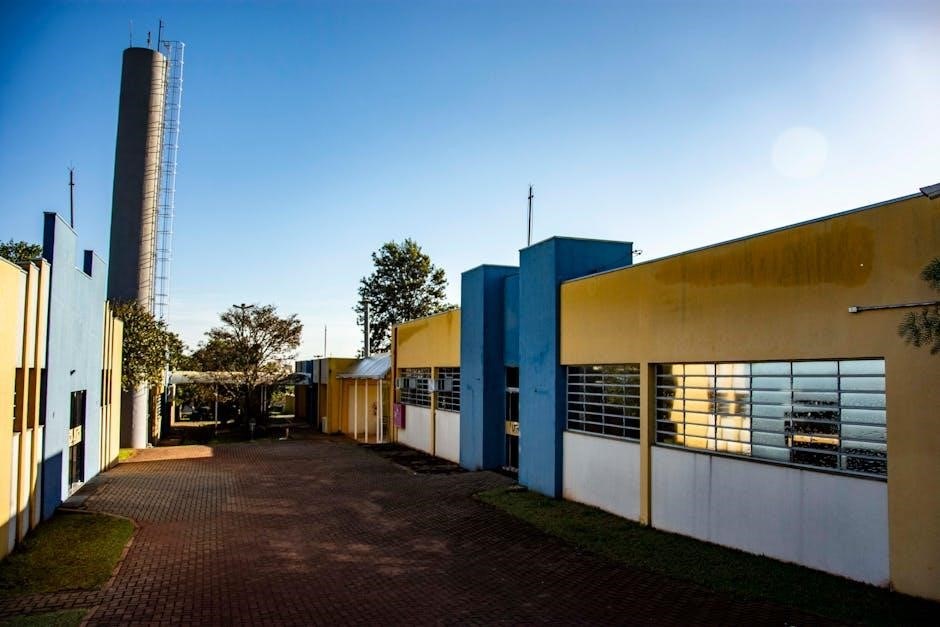Colorado divorce papers are official documents required to initiate and finalize a divorce. Available in PDF format, they ensure compliance with state legal standards and procedures.
1.1 Overview of Divorce in Colorado
Divorce in Colorado is a legal process that dissolves a marriage. The state requires residency, with one spouse living in Colorado for at least 30 days before filing. Colorado is a no-fault state, meaning the marriage is deemed irretrievably broken. The process involves filing a petition, serving papers, and completing mandatory forms. A 91-day waiting period applies from filing to finalization. Both contested and uncontested divorces are handled, with specific requirements for cases involving children or property division.
1.2 Importance of Using Official Forms
Using official Colorado divorce forms is crucial for ensuring legal compliance and avoiding delays. These forms are standardized to meet specific requirements, reducing errors and rejected filings. They include mandatory sections like case information and petitions, guiding filers through necessary disclosures. Properly completed forms help courts process cases efficiently, preventing legal complications. Additionally, official forms provide clear instructions, making it easier for individuals to navigate the process accurately, even without legal representation.
Essential Forms for Colorado Divorce
Key Colorado divorce forms include JDF 1000 (Case Information Sheet), JDF 1101 (Petition for Divorce), and JDF 1102 (Summons for Response), ensuring a legally valid divorce process.
2.1 Mandatory Forms for Filing
The essential forms required to file for divorce in Colorado include JDF 1000 (Case Information Sheet), JDF 1101 (Petition for Dissolution of Marriage), and JDF 1102 (Summons for Response). These documents initiate the legal process and provide the court with necessary details about the marriage, parties involved, and the grounds for divorce. Additional forms may be required depending on specific circumstances, such as the presence of children or joint assets. Ensuring all mandatory forms are accurately completed is crucial for compliance and progression of the case.
2.2 Additional Forms for Specific Circumstances
Depending on the situation, additional forms may be required, such as JDF 205 (Motion to File Without Payment) for fee waivers or JDF 1005 (Financial Affidavit) for disclosing financial details. If children are involved, forms like JDF 1113 (Parenting Plan) and JDF 1317 (Child Support Worksheet) are necessary. For contested divorces, a Summons and Response may be needed. These forms ensure all aspects of the divorce are addressed, from financial obligations to child custody arrangements, tailored to the specific needs of the case.
Obtaining Divorce Papers in Colorado
Divorce papers in Colorado can be downloaded as PDF forms from the Colorado Judicial Branch website or obtained in person at local court clerk offices.
3.1 Downloading Forms from Official Websites
Divorce papers in Colorado can be downloaded from the Colorado Judicial Branch website. The site provides PDF forms, including the Petition for Dissolution of Marriage (JDF 1101) and Summons (JDF 1102). These forms are free and include instructions. Users can access them by visiting the Self-Help Forms section and selecting Divorce and Family Matters. The website also offers fillable PDF versions, making it easier to complete the forms electronically before printing. Ensure to use the most recent versions for accuracy and compliance with court requirements.
3.2 Accessing Forms in Person
Individuals can obtain Colorado divorce papers in person by visiting the Court Clerk’s office. The office is located at 100 Jefferson County Parkway, Golden, CO 80401. Forms are available for a fee, though official websites offer free downloads. The Clerk’s office provides access to all necessary documents, including Petition for Dissolution of Marriage and related forms. Visitors can request assistance from court staff to ensure they receive the correct paperwork. This option is ideal for those who prefer in-person guidance or lack internet access.

Completing the Divorce Papers
Accurately fill out all required forms, ensuring correct personal and financial details. Use current, official Colorado divorce forms, such as JDF 1000 and JDF 1101, to avoid delays.
4.1 Filling Out Forms Accurately
When completing Colorado divorce forms, precision is key to avoid delays. Use the latest versions of forms like JDF 1102 for summons and JDF 1000 for case information. Ensure all personal details, financial data, and custody arrangements are correct. Attach required documents, such as property agreements or child support plans. Inaccuracies may lead to form rejection, so double-check each section. For complex cases, consider consulting legal aid or using Colorado’s online self-help resources to ensure compliance and avoid potential legal issues.
4.2 Tips for Successful Form Completion
Use the latest versions of Colorado divorce forms to ensure compliance. Fill forms electronically for clarity, and print them on white paper. Both spouses must sign where required, typically in the presence of a notary. Attach necessary documents, such as property agreements or child support plans. Double-check all information for accuracy before submission. For complex cases, consider legal assistance or Colorado’s self-help resources. Organize forms in the correct order to avoid delays in processing.

Filing the Divorce Papers
Filing involves submitting completed forms to the court clerk, ensuring all signatures and documents are in order for proper processing.
5.1 Filing Fees and Costs
Filing divorce papers in Colorado requires paying court fees, which vary by jurisdiction. The average filing fee is approximately $230, though this may change. Additional costs for service of process, such as hiring a process server or sheriff, apply. Fee waivers are available for individuals unable to afford these costs, requiring the submission of a Motion to File Without Payment (JDF 205) and a Supporting Financial Affidavit (JDF 206). Detailed financial disclosures are necessary for eligibility.
5.2 Fee Waivers and Financial Affidavits
Individuals unable to afford filing fees may request a fee waiver by submitting a Motion to File Without Payment (JDF 205) and a Supporting Financial Affidavit (JDF 206). The affidavit requires detailed disclosure of income, expenses, assets, and liabilities. The court reviews this information to determine eligibility for a waiver, ensuring access to justice for those with financial hardships. This process helps make divorce proceedings more equitable for all parties involved.

Serving the Divorce Papers
Serving divorce papers in Colorado involves delivering legal documents to the spouse, ensuring they are formally notified. Proper service is required to proceed with the case.
6.1 Methods of Service
In Colorado, divorce papers must be served through approved methods. Personal service involves delivering documents directly to the spouse, often via a sheriff or process server. Certified mail with a return receipt is another option, providing proof of delivery. Service by publication is allowed if the spouse’s location is unknown, requiring court approval and publication in a newspaper. Proper documentation of service must be filed with the court to ensure the case proceeds legally.
6.2 Proof of Service Requirements
Proof of service confirms that divorce papers were legally delivered. In Colorado, this requires filing an affidavit or certified receipt with the court. Personal service, certified mail, or publication methods must be documented. Forms like JDF 1000 (Case Information Sheet) and JDF 1101 (Petition for Divorce) often include sections for service verification. Proper proof ensures the case proceeds validly, as the court must confirm the spouse was notified. Failure to provide adequate proof may delay or invalidate the divorce process.

Legal Considerations
Colorado requires specific forms like JDF 1000 and JDF 1101 to initiate divorce. Proper documentation and compliance with state laws ensure the process is legally valid and recognized.
7.1 Grounds for Divorce in Colorado
Colorado is a no-fault divorce state, meaning the most common ground for divorce is the irretrievable breakdown of the marriage. Specific statutory grounds include adultery, cruelty, and abandonment. The court requires detailed documentation of the reason for dissolution, which must align with Colorado Revised Statutes. Properly stating the grounds ensures the divorce process proceeds smoothly. Forms like JDF 1101 outline the necessary information for filing.
7.2 Residency Requirements
At least one spouse must reside in Colorado for 91 days before filing for divorce. The case must be filed in the county where the residing spouse lives. Colorado requires a 31-day waiting period after filing before the divorce can be finalized. Proper residency documentation must be submitted to validate the court’s jurisdiction. This ensures the court can legally process the divorce papers and make binding decisions.
Special Cases
Special cases involve unique circumstances, such as divorce with children or contested vs. uncontested cases, requiring additional legal considerations and specific forms to address these situations properly.
8.1 Divorce with Children
Divorce cases involving children require additional forms to address custody, support, and parenting plans. Forms like JDF 1000 (Case Information Sheet) and JDF 1101 (Petition for Divorce) are essential. These documents ensure child-related issues are thoroughly detailed, including custody arrangements, child support calculations, and parenting responsibilities. Court approval is mandatory to guarantee the best interests of the child. Proper completion of these forms is crucial for a fair and legally binding resolution, ensuring both parents’ rights and the child’s well-being are protected.
8.2 Contested vs. Uncontested Divorce
A contested divorce occurs when spouses disagree on issues like property division, custody, or support, requiring court intervention. An uncontested divorce involves mutual agreement on all terms, streamlining the process. In Colorado, uncontested cases often use simplified forms like JDF 1101 (Petition for Divorce) and JDF 1000 (Case Information Sheet). Contested cases may require additional forms and court appearances, potentially leading to mediation or trial to resolve disputes.
Finalizing the Divorce
Finalizing a divorce in Colorado involves completing the waiting period and obtaining the final decree. This document legally ends the marriage and outlines the agreed-upon terms.
9.1 The Waiting Period
In Colorado, a mandatory waiting period of at least 91 days applies from the date the divorce petition is filed or served. This period allows time for reconciliation or negotiation. During this time, parties can work on agreements regarding property, custody, and support. The waiting period ensures both spouses have ample opportunity to review and finalize terms before the divorce is legally granted. It begins when the petition is filed or served, whichever occurs first.
9.2 Final Decree and Its Implications
The final decree is the official document that legally ends a marriage in Colorado; It is issued after the mandatory waiting period and all necessary procedures are completed. Once signed by the judge, the decree becomes a public record and is irrevocable. It outlines the agreed-upon terms, such as property division, child custody, and spousal support. Both parties must abide by its terms, and it allows either spouse to remarry if desired. The decree marks the formal conclusion of the divorce process.

Additional Resources
Colorado offers self-help centers and legal aid services to assist with divorce proceedings. Visit the Colorado Judicial Branch website for downloadable forms, guides, and legal consultation options.
10.1 Self-Help Centers and Court Assistance
Self-help centers and court assistance programs in Colorado provide guidance for individuals navigating divorce proceedings. These resources offer access to PDF divorce forms, step-by-step instructions, and legal aid. Many centers assist with form completion, filing procedures, and understanding court requirements. Additionally, some programs offer free or low-cost legal consultations for those who cannot afford an attorney. Workshops and online tools are available to help individuals manage their cases efficiently. Visit the Colorado Judicial Branch website or local court offices for more information on these supportive services.
10.2 Legal Aid and Consultation Options
For those needing guidance, Colorado offers legal aid and consultation services. Non-profit organizations provide free or low-cost legal advice for individuals handling divorce paperwork. Attorney consultations can clarify complex issues, while court-appointed representatives assist in specific cases. Online resources, such as the Colorado Judicial Branch, offer form completion guides and legal FAQs. These services ensure access to justice, even for those with limited financial resources, helping them navigate the divorce process effectively and efficiently.
Colorado divorce papers streamline the legal process, ensuring clarity and efficiency. With accessible PDF forms and clear instructions, individuals can navigate the system confidently, achieving resolution smoothly.
11.1 Summary of Key Steps
Accessing Colorado divorce papers begins with downloading official PDF forms from trusted sources. Ensure accuracy when filling out mandatory forms like JDF 1000 and JDF 1101. Properly serve papers to your spouse and file them with the court, paying required fees or requesting waivers if needed. Complete all steps diligently, including submitting financial affidavits and attending hearings. Finally, await the court’s issuance of the final divorce decree, marking the legal end of the marriage.
11.2 Final Tips for a Smooth Process
To ensure a smooth Colorado divorce process, use current official forms from trusted sources. Fill them accurately, seeking legal advice if needed. Submit all required documents, including financial affidavits, on time. Communicate clearly with your spouse and the court to avoid delays. Consider mediation for uncontested cases to save time and costs. Keep organized records and follow court instructions carefully to finalize your divorce efficiently and without unnecessary complications.
